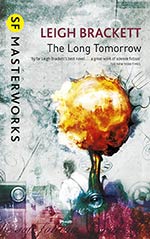
![]() couchtomoon
couchtomoon
1/28/2015
![]()
Len Colter sat in the shade under the wall of the horse barn, eating pone and sweet butter and contemplating a sin [7].
That's a killer first line. And now I want some cornbread.
With its bucolic setting and unsophisticated characters, as well as some rambunctious river moments with two growing boys, it's as though The Long Tomorrow invites the tradition of Mark Twain into the realm of SF, supporting the success of Ray Bradbury's nostalgia stories and setting the stage for Clifford Simak's pastoral entreaties for peace in the following decade. (Yes, I know Twain wrote sci-fi. I saw that episode of Next Gen, too.)
An excellent example of a post-WWII attempt at post-apocalyptic fiction, a tradition that has endured and endured and endured. I often wonder if, after we finally suffer the apocalypse that humanity seems to crave, will we then sit around the campfire telling gripping stories about copy machines, fast food tacos, and skyscrapers.
In The Long Tomorrow, Brackett explores that same question.
Some eighty years after nuclear war, humanity's survivors endure in pastoral communities ruled by religious sects, while a federal law forbids the establishment of cities. Len and Esau, teenagers of the New Mennonites of Piper's Run, fantasize about the cities of the past, with their metal skyscrapers, electric lights, and automobiles. When the punishments for their technological transgressions go too far, the boys decide to break free of their stifling community in search of the mythical Bartorstown, where technology and science are celebrated and preserved.
Brackett is better known for her screenwriting career, with credits on popular hardboiled crime movies and some involvement in The Empire Strikes Back, and even most of her own bibliography is crime and space opera stuff. The Long Tomorrow is an unusual piece in the Brackett oeuvre, though many consider it to be her best. Whatever the state of her other novels, this is an excellent place to start. (For more on her other works, Admiral Ironbombs has been having a field day with Brackett. Seven entries!)
Extremely readable and thematically immense, The Long Tomorrow tugs on the worries of a post-war world, a planet sitting on its own atomic power while two superpowers wobble in a precarious balance. This coming-of-age tale about Len and Esau mirrors the loss of innocence of post-WWII nations, where mid-20th citizens grapple with the consequences of the pursuit of knowledge and technology, while mid-20th nations grapple with each other. Len and Esau want to know things. They're fearful, but warnings of danger don't stop them.
Could you give up all the mystery and wonder of the world? Could you never see it, and never want to see it? Could you stop the waiting, hoping eagerness to hear a voice from nowhere, out of a little square box? [42]
The boys dance a precarious dance, both experiencing a spectrum of convictions, but never at the same time, constantly in flux with one another. Constantly in a bid to outdo and overpower one another. They blame each other for their uncomfortable pursuits. They are never in harmony.
Len. Esau. Lenin. USA. I know it's the wrong time and conflict for Lenin, but maybe? Just because "Stal" is a crappy name? And maybe "Nik" is too obvious. (I searched around to see if someone else noticed this, and came up empty. So maybe I'm stretching. Me? Stretching? Never!)
But as much as this taps into the current events of the time, this is no study in polemics. Brackett explores the arc along with the reader, and questions are left to drift in the post-nuclear wind. Is knowledge worth the sacrifice of blissful ignorance? When the boys finally get their wish, their skins practically crawl with fear when confronted with certain technologies. Maybe ignorance sounds good again. But, can one ever return to ignorance? (Think on this before you judge the ending.)
Of the flaws, the women are thin in character and agency (read: annoying), typical for fifties SF, but surprising to see from a female author. We do get people of color, a tiny bit, but the one Hispanic is an alcoholic, and Len can't help noticing the beautiful white skin of the (assumed to be) Native American daughter. This thinness does, however, lend some validity to the product-of-their-time apologists (myself included). The fifties just sucked for women and POCs, even in imaginary tales, even when written by women. Them's the facts.
But, it's remarkable how much Brackett packs in to this 200-page novel based on themes of Cold War social tensions, the risk of knowledge, the power of individuality, and socio-psychological conditioning. She explores post-apocalyptic power structures, the roles of religion in times of fear, and the manifestations of oppression in various societies.The tale feels literary as Brackett experiments with structure and foreshadowing. Her protagonists are developed, not just as agents of the narrative like many early SF characters, but as independent personalities. Len and Esau change and grow, sometimes in unpredictable ways that only make sense upon reexamination.
I'm happy to have found such a satisfying piece of fifties SF with Leigh Brackett. Nothing I've read from this decade comes close to this level of sophistication.
 Recommended for readers who want to read fifties SF, but can't stand the stilted prose.
Recommended for readers who want to read fifties SF, but can't stand the stilted prose.
Recommended for readers looking for proof that women have been writing SF for a long time, and doing it well (better).
Recommended for readers who want to like Bradbury, but think he's too heavy-handed with the metaphors.
Recommended for readers who love post-apocalyptic fiction.
http://couchtomoon.wordpress.com